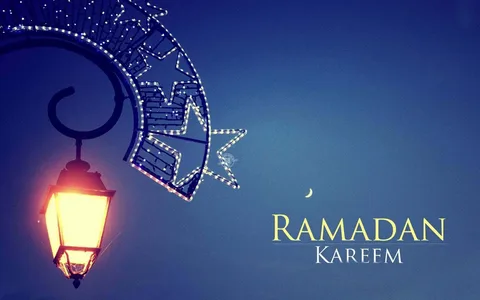Ramadan, the holiest month in Islam, is celebrated by millions of Muslims worldwide. During this sacred time, individuals observe fasting, engage in prayer, and practice self-reflection. It’s also a time for community, generosity, and expressing well wishes to loved ones. In this article on Arabian Tongue, we’ll delve into the significance of Ramadan greetings in english, exploring both traditional and modern expressions commonly used during this auspicious month.
Traditional Ramadan Greetings

Ramadan Kareem
“Ramadan Kareem” translates to “Generous Ramadan” in English. This phrase is widely used to convey blessings and well wishes for a fruitful and generous month ahead. It reflects the spirit of Ramadan, emphasizing generosity, compassion, and abundance.
Ramadan Mubarak
“Ramadan Mubarak” translates to “Blessed Ramadan” in English. This greeting is a simple yet profound way to extend blessings and good wishes for a blessed and fulfilling month of Ramadan. It conveys a sense of reverence and gratitude for the spiritual significance of the month.
Modern Ramadan Greetings
Peace and Blessings Upon You
In modern times, variations of traditional greetings are often used to cater to diverse cultural contexts. Phrases like “Peace and blessings upon you during Ramadan” encapsulate the essence of Ramadan greetings while embracing a broader audience.
Wishing You a Joyful Ramadan
This contemporary greeting focuses on spreading joy and positivity during Ramadan. It reflects the importance of fostering happiness and unity within the community, emphasizing the celebration aspect of the holy month.
Tips for Sending Ramadan Greetings
- Personalize Your Greetings: Tailor your ramadan messages to the individual recipient, adding a personal touch that resonates with them.
- Respect Cultural Sensitivities: Be mindful of cultural differences and religious customs when sending greetings to ensure inclusivity and respect.
- Share Acts of Kindness: Accompany your greetings with acts of kindness and charity, embodying the spirit of generosity and compassion synonymous with Ramadan.
- Learn the Proper Greetings: Familiarize yourself with appropriate Ramadan greetings such as “Ramadan Mubarak” (Blessed Ramadan) or “Ramadan Kareem” (Generous Ramadan). Using these greetings shows respect and understanding of the significance of the month.
- Consider the Recipient: Tailor your message to the recipient’s level of observance and cultural background. For example, you might choose a more formal or traditional greeting for older family members or colleagues, while opting for a more casual tone with friends.
- Personalize Your Message: Add a personal touch to your greeting by including the recipient’s name or referencing specific Ramadan traditions or activities they enjoy. This shows that you’re thinking specifically of them during this special time.
Importance of Ramadan Greetings in English

Ramadan greetings in English hold significant importance as they reflect the spirit of solidarity, compassion, and goodwill among Muslims during the holy month of Ramadan. Here are some reasons why Ramadan greetings are important:
- Expressing Respect: Ramadan greetings allow people to acknowledge and respect the religious observance of fasting and spiritual reflection undertaken by Muslims during this month.
- Fostering Unity: Sending Ramadan greetings promotes unity and understanding among people of different faiths and cultures, fostering a sense of belonging and inclusivity within communities.
- Cultural Exchange: In multicultural societies, exchanging Ramadan greetings provides an opportunity for cultural exchange and enhances interfaith dialogue, promoting tolerance and mutual respect.
- Building Relationships: Sending Ramadan greetings is a way to strengthen relationships with friends, colleagues, and neighbors who observe the fast, fostering a sense of camaraderie and goodwill.
- Spreading Happiness: Ramadan greetings bring joy and happiness to both the sender and the recipient, fostering positive vibes and uplifting spirits during this special time.
- Encouraging Generosity: The act of sending Ramadan greetings can inspire acts of kindness and generosity, encouraging individuals to extend help and support to those in need during the month of fasting.
- Promoting Spiritual Reflection: Ramadan greetings often include blessings and well-wishes for spiritual growth and reflection, reminding individuals of the deeper meaning and purpose of the month.
Learn Now: learn quran reading basics online course
What’s the best way to respond to Ramadan greetings?
Responding to Ramadan greetings is a thoughtful way to reciprocate the goodwill and blessings extended to you during this holy month. Here are some ways to respond graciously:
- Traditional Response: A common and traditional response to Ramadan greetings is “Ramadan Mubarak” or “Ramadan Kareem,” which respectively mean “Blessed Ramadan” and “Generous Ramadan.” These phrases convey your appreciation for the greeting and reciprocate the blessings.
- Thank You: A simple “Thank you” with a warm smile is always a polite and gracious response to someone offering Ramadan greetings. It acknowledges their kindness and goodwill.
- Return the Greeting: You can also respond by returning the greeting. For example, if someone says “Ramadan Mubarak” to you, you can respond with the same greeting, wishing them a blessed Ramadan as well.
- Add Personal Touch: If you feel comfortable, you can add a personal touch to your response by expressing your own heartfelt wishes for their well-being during Ramadan. For example, you could say, “Thank you! Wishing you a peaceful and spiritually fulfilling Ramadan.”
- Express Gratitude: Express your gratitude for their thoughtfulness in remembering and acknowledging the significance of Ramadan. You could say, “I appreciate your kind words. May this Ramadan bring you and your loved ones abundant blessings.”
- Extend Wishes: Extend your own wishes for their health, happiness, and spiritual growth during Ramadan. For instance, you might say, “Thank you for the Ramadan greetings. I wish you a month filled with peace, joy, and spiritual enlightenment.”
- Respond in Kind: If you know the person well and it’s appropriate, you can respond with a more personal message, such as sharing your hopes for their Ramadan activities or expressing your appreciation for their friendship.
FAQs
Can non-Muslims send Ramadan greetings?
Absolutely! Sending Ramadan greetings is a gesture of respect and inclusivity that is appreciated by Muslims and non-Muslims alike.
What's the best way to respond to Ramadan greetings?
Are there any specific times of day to send Ramadan greetings?
While there are no strict rules, it's thoughtful to send greetings during daylight hours, avoiding meal times when individuals may be fasting.
Can Ramadan greetings be sent digitally?
Yes, sending electronic messages or e-cards is a common and convenient way to extend Ramadan greetings to friends, family, and colleagues.
How long does Ramadan last?
Ramadan typically lasts for 29 or 30 days, depending on the sighting of the moon, culminating in the celebration of Eid al-Fitr.
Conclusion
Ramadan greetings in English encompass a rich tapestry of tradition, spirituality, and cultural diversity. Whether through traditional phrases like “Ramadan Kareem” and “Ramadan Mubarak” or modern expressions of goodwill, these greetings exemplify the universal values of compassion, generosity, and unity that define the spirit of Ramadan.


